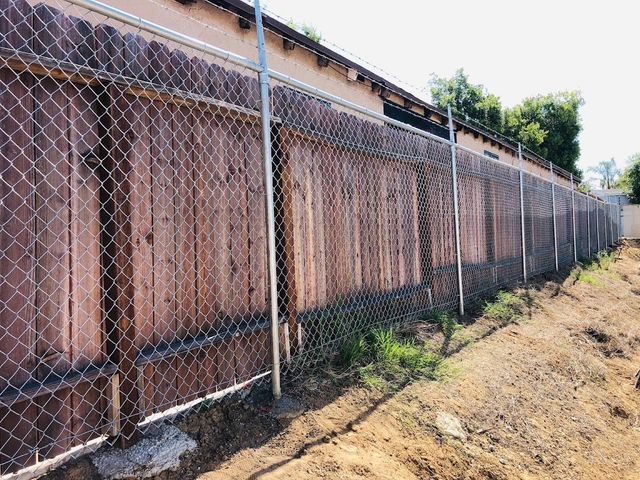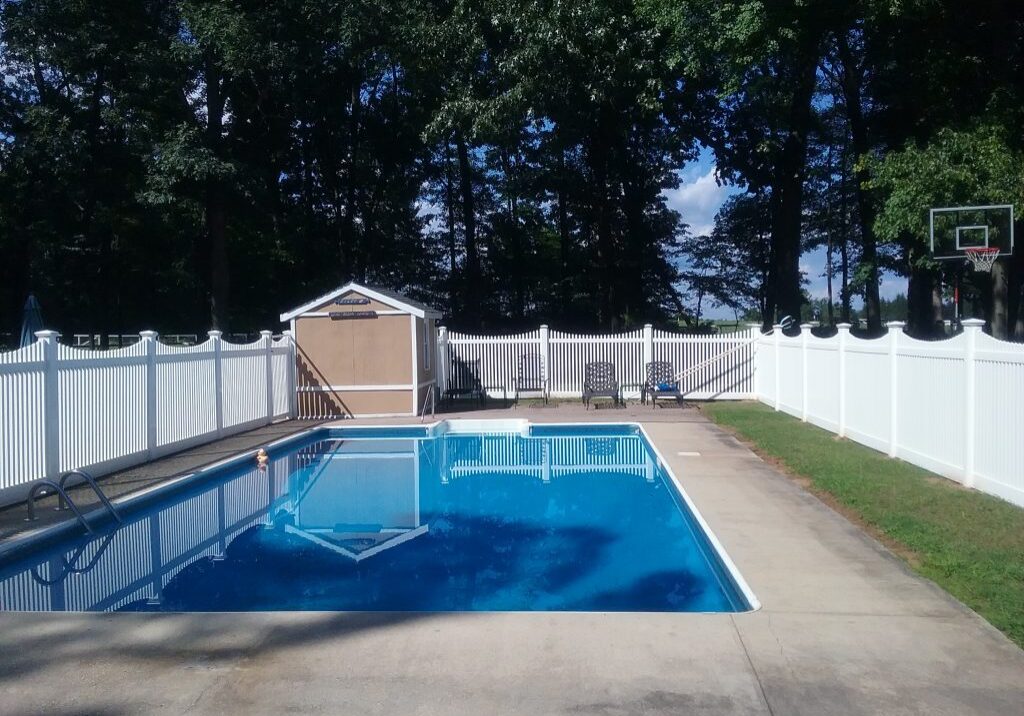All Categories
Featured
Choosing the best fencing material for your building is not practically aesthetic appeals; it has to do with privacy, longevity, and safety and security. Whether you're looking to improve the elegance of your home or organization, protect your home, or create a personal sanctuary, the material you pick will play a substantial function in accomplishing your objectives. With numerous secure fencing options readily available, it is essential to recognize the advantages and drawbacks of each prior to making your decision.
Benefits:
Natural Aesthetic: Timber has a cozy, natural appeal that boosts the look of any kind of residential property. Adjustable: Wood fences can be painted, stained, or left untreated to achieve different styles. Personal privacy: A tall wood fence can provide a high degree of privacy for your home. Downsides:
Upkeep Required: Timber fences need routine maintenance, including discoloration and sealing to stop damages from weather and bugs. Susceptible to Climate: Wood can warp, rot, or come to be plagued with termites otherwise effectively preserved. Shorter Life-span: Compared to products like vinyl or metal, wood typically has a shorter life-span. Best For: House owners trying to find a conventional, personalized, and natural appearance.
![]()
Benefits:
Reduced Maintenance: Plastic does not require painting, staining, or sealing. It's simple to tidy with an easy tube down. Sturdy: Resistant to rot, termites, and climate, plastic fencings last much longer than timber fences. Selection of Styles: Offered in many designs, colors, and appearances to fit any property. Drawbacks:
Higher Initial Expense: The in advance cost of plastic fence is typically greater than wood or chain web link. Prone to Breaking: In severe chilly or with hefty effect, vinyl fencings can break or fracture. Much less Adjustable: Unlike wood, vinyl offers fewer options for paint or staining. Best For: Services or house owners trying to find a low-maintenance, lasting, and durable fence choice.
Benefits:
Strength and Sturdiness: Steel fencings are strong, resistant to use, and lasting. Low Maintenance: When installed, metal fences require little upkeep, specifically aluminum, which resists rust. High Security: Steel fences are difficult to climb and offer an effective obstacle against trespassers. Downsides:
Cost: Metal fencings, specifically wrought iron and steel, can be much more costly than other choices. Corrosion and Corrosion: Steel fences, particularly, might rust without correct therapy. Light weight aluminum is corrosion-resistant, however wrought iron needs regular maintenance. Minimal Personal privacy: Steel fencings do not supply much personal privacy unless they are combined with other materials, like timber slats or vinyl inserts. Best For: Those that prioritize security and resilience over privacy, or those with an upscale residential or commercial property in requirement of a stylish, timeless fence.
Advantages:
Cost-efficient: Chain web link is just one of one of the most affordable fencing alternatives readily available. Reduced Maintenance: Once installed, wire mesh fence require little maintenance past occasional cleaning. Long lasting: Chain link is solid and can last for years if correctly preserved. Drawbacks:
![]()
Limited Aesthetics: Wire mesh fence do not give the visual allure of wood or functioned iron, and can look utilitarian. Privacy Concerns: Unless privacy slats or plastic coatings are included, wire mesh fence do not use much privacy. Less Safe in Some Locations: While chain link gives safety and security, it can be quickly scaled or reduced otherwise installed with added safety features. Best For: Industrial properties, large houses, or locations where protection is more vital than appearances.
Advantages:
Low Upkeep: Composite fencings require no discoloration, securing, or paint. Sturdiness: Immune to bugs, rot, and weather condition damage, composite fencings last much longer than timber. Eco-Friendly: Several composite fencings are made from recycled materials, making them a sustainable alternative. Disadvantages:
Greater Expense: Compound fences can be much more pricey than typical wood or plastic choices. Restricted Personalization: While offered in different shades and styles, composite fences do not provide the very same personalization alternatives as wood fencings. Heavy: Compound fence materials can be heavier than various other choices, making setup more labor-intensive. Best For: Eco-conscious home owners or businesses searching for a low-maintenance, durable, and sustainable fencing material.
Verdict. Choosing the right fencing material for your residential property inevitably depends on your priorities-- whether it's protection, privacy, aesthetics, or low maintenance. From traditional wood and affordable chain link to durable vinyl and solid metal, each product provides unique advantages fit to various requirements. By taking into consideration factors like budget plan, setup time, upkeep requirements, and long-term longevity, you can pick the ideal fence that satisfies your residential property's details needs.
- Timber Fencing. Timber is one of one of the most prominent fence materials as a result of its adaptability, timeless appeal, and all-natural look. It's perfect for homes and can be utilized in a variety of styles, consisting of personal privacy fencings, picket fencings, and post-and-rail fencings.
Benefits:
Natural Aesthetic: Timber has a cozy, natural appeal that boosts the look of any kind of residential property. Adjustable: Wood fences can be painted, stained, or left untreated to achieve different styles. Personal privacy: A tall wood fence can provide a high degree of privacy for your home. Downsides:
Upkeep Required: Timber fences need routine maintenance, including discoloration and sealing to stop damages from weather and bugs. Susceptible to Climate: Wood can warp, rot, or come to be plagued with termites otherwise effectively preserved. Shorter Life-span: Compared to products like vinyl or metal, wood typically has a shorter life-span. Best For: House owners trying to find a conventional, personalized, and natural appearance.
- Plastic (PVC) Fence. Vinyl fences are a significantly popular option because of their low maintenance and toughness. Made from artificial products, plastic fences are resistant to rot, decay, and pests. Readily available in a series of styles and shades, plastic fencing can be made to imitate the appearance of timber without the associated maintenance.

Benefits:
Reduced Maintenance: Plastic does not require painting, staining, or sealing. It's simple to tidy with an easy tube down. Sturdy: Resistant to rot, termites, and climate, plastic fencings last much longer than timber fences. Selection of Styles: Offered in many designs, colors, and appearances to fit any property. Drawbacks:
Higher Initial Expense: The in advance cost of plastic fence is typically greater than wood or chain web link. Prone to Breaking: In severe chilly or with hefty effect, vinyl fencings can break or fracture. Much less Adjustable: Unlike wood, vinyl offers fewer options for paint or staining. Best For: Services or house owners trying to find a low-maintenance, lasting, and durable fence choice.
- Steel Fence (Light Weight Aluminum, Steel, and Wrought Iron) Metal fences are understood for their stamina, protection, and aesthetic value. Aluminum, steel, and functioned iron fencings are typically utilized in property, industrial, and commercial settings, supplying high degrees of security and an advanced look.
Benefits:
Strength and Sturdiness: Steel fencings are strong, resistant to use, and lasting. Low Maintenance: When installed, metal fences require little upkeep, specifically aluminum, which resists rust. High Security: Steel fences are difficult to climb and offer an effective obstacle against trespassers. Downsides:
Cost: Metal fencings, specifically wrought iron and steel, can be much more costly than other choices. Corrosion and Corrosion: Steel fences, particularly, might rust without correct therapy. Light weight aluminum is corrosion-resistant, however wrought iron needs regular maintenance. Minimal Personal privacy: Steel fencings do not supply much personal privacy unless they are combined with other materials, like timber slats or vinyl inserts. Best For: Those that prioritize security and resilience over privacy, or those with an upscale residential or commercial property in requirement of a stylish, timeless fence.
- Chain Web Link Fence. Wire mesh fence are just one of the most inexpensive and functional options available. Generally used in business settings, they can also be an excellent option for properties, specifically if security is a top priority. Wire mesh fence are offered in different elevations and can be tailored with personal privacy slats for added security.
Advantages:
Cost-efficient: Chain web link is just one of one of the most affordable fencing alternatives readily available. Reduced Maintenance: Once installed, wire mesh fence require little maintenance past occasional cleaning. Long lasting: Chain link is solid and can last for years if correctly preserved. Drawbacks:

Limited Aesthetics: Wire mesh fence do not give the visual allure of wood or functioned iron, and can look utilitarian. Privacy Concerns: Unless privacy slats or plastic coatings are included, wire mesh fence do not use much privacy. Less Safe in Some Locations: While chain link gives safety and security, it can be quickly scaled or reduced otherwise installed with added safety features. Best For: Industrial properties, large houses, or locations where protection is more vital than appearances.
- Compound Fencing. Composite fences incorporate timber fibers and plastic to create a durable, environmentally friendly choice to traditional timber secure fencing. These fences have the look of wood however need a lot less upkeep and are resistant to rot, pests, and fading.
Advantages:
Low Upkeep: Composite fencings require no discoloration, securing, or paint. Sturdiness: Immune to bugs, rot, and weather condition damage, composite fencings last much longer than timber. Eco-Friendly: Several composite fencings are made from recycled materials, making them a sustainable alternative. Disadvantages:
Greater Expense: Compound fences can be much more pricey than typical wood or plastic choices. Restricted Personalization: While offered in different shades and styles, composite fences do not provide the very same personalization alternatives as wood fencings. Heavy: Compound fence materials can be heavier than various other choices, making setup more labor-intensive. Best For: Eco-conscious home owners or businesses searching for a low-maintenance, durable, and sustainable fencing material.
Verdict. Choosing the right fencing material for your residential property inevitably depends on your priorities-- whether it's protection, privacy, aesthetics, or low maintenance. From traditional wood and affordable chain link to durable vinyl and solid metal, each product provides unique advantages fit to various requirements. By taking into consideration factors like budget plan, setup time, upkeep requirements, and long-term longevity, you can pick the ideal fence that satisfies your residential property's details needs.
Latest Posts
Find Cost-Effective Auto Repairs with Montclare’s Limited-Time Service Specials
Published en
1 min read
Learn About Leading Vehicle Maintenance Services in Chicago – Drive with Confidence
Published en
1 min read
Don’t Miss Special Auto Repair Deals in Chicago at Montclare Auto Repair
Published en
1 min read
More
Latest Posts
Find Cost-Effective Auto Repairs with Montclare’s Limited-Time Service Specials
Published May 25, 25
1 min read
Learn About Leading Vehicle Maintenance Services in Chicago – Drive with Confidence
Published May 25, 25
1 min read
Don’t Miss Special Auto Repair Deals in Chicago at Montclare Auto Repair
Published May 20, 25
1 min read